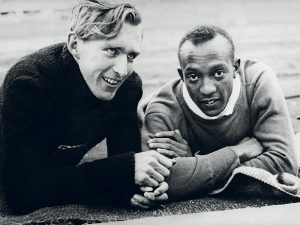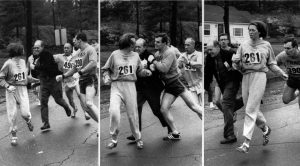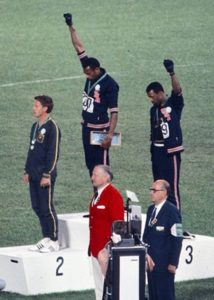In Rationality Rules’ latest transphobic video, one phrase in particular caught my ears.
[3:57] The way that the IAAF put it, was that double-amputee sprinter Oscar Pistorius is ineligible to compete at the Beijing Olympics because his prosthetic racing legs give him a clear competitive advantage; or in other words, the IAAF ruled the Pistorius’ prosthetics disqualify him because they make him faster than what he would have been if he had not lost his legs. Now this reasoning is critical, as it embodies both the principle of “fair play” and the principle of therapeutic use exceptions, otherwise known as TUE’s.
[5:42] … a collection of experts criticized the cited study for only testing Pistorius’s biomechanics at full speed while running in a straight line, unlike a real 400 meter race, and for not accounting for the disadvantages that he suffers, such as having trouble leaving the starting block; and as a result, Pistorius is ineligible status was lifted. He was allowed to compete. … [6:24] as we move on to the transgender athletic debate, please keep in mind the principle of “fair play,” the principle of TUEs, and Pistorius’ case as a whole.
[20:02] I am not opposed to trans women who have experienced male puberty competing in the female category of SOME events because they’re trans. I am opposed because the attributes which are granted from male puberty that play a vital role in some events have not been shown to be sufficiently mitigated by HRT. It’s not about whether or not they’re women, it’s about whether or not “fair play” has been maintained.
Rationality Rules never details what “fair play” is, in fact you’ve just read every mention of the term in that video. At the same time, his argument strongly relies on it. That makes the lack of any definition a curious omission.
What is “fair play?” The International Fair Play Committee is a non-profit set up to promote the concept, and they have a pretty big page detailing the term.
Respect: For every athlete, playing by the written rules is mandatory, and respecting the unwritten ones is a must. Fair play requires unconditional respect for opponents, fellow players, referees and fans.
Fair competition: To enjoy the fruits of success, it is not enough to win. Triumph must be measured by absolute fair means, honesty and just play.
Equality: Competing on equal terms is essential in sport. Otherwise, performance cannot be measured properly.
Sport without doping: Fair play means not cheating by taking drugs or doping. Anyone who does this ruins the game for everyone else.
Some of it perfectly aligns with Rationality Rules’ arguments. Some of it, though…
Friendship: Rivalry on the field does not exclude friendship. On the contrary, friendship could grow from noble rivalries.
Team spirit: Individuals can be strong on their own, but they are much stronger in a team. Sharing the moment of victory with your team is the ultimate pleasure.
Solidarity: It is important to support each other and share feelings, aims and dreams. Mutual support brings mutual success on and off the field.
Tolerance: The willingness to accept behaviour or decisions you may not agree with develops your self-control. Ultimately, that could be the deciding factor when it comes to winning or losing.
Care: True champions care about each other as they are well aware that they could not be where they are without having been cared for by others.
Joy: Pierre de Coubertin, the father of the modern Olympic Games said: “The important thing in life is not the triumph, but the fight. The essential thing is not to have won, but to have fought well.” Competition can be intense, but you should always first look for joy when practicing any sports. You should never forget about the play even in the heat of the fight.
… some of it sounds very progressive and focused on social justice. That is entirely by design. In Ancient Greece, city-states were constantly fighting with one another. That made it somewhat difficult for athletes and spectators to travel, so all the city-states agreed to a truce during the Olympics. That feeling of peace extended to the games themselves, which were held on neutral, sacred ground. Bitter rivals were forced to sit next to one another, and maybe by watching each other behave like human beings they’d be less likely to dehumanize their fellow Greeks in future.
Europe just before the year 1900 was about as fractured as Ancient Greece, and had since developed much more efficient ways to kill one another. That Pierre de Coubertin chap was desperate to cool down the flames, and you can see why the idea of a global sporting event was so tempting. Lure people in with the promise of glory through competition, and hope they walk away with more solidarity towards people they’d otherwise consider enemies.
 This extends right down to what we hold up as great moments in sport. While growing up, I don’t remember my classes spending any time on how dominant Canada’s hockey team was in the Olympics. What I do remember is being taught about Jesse Owen’s medals in track-and-field during the ’36 Olympics. Hitler and the Nazi’s were promoting the idea that fair-skinned “Aryans” were the best race of people, yet here was a black man trouncing every German athlete on German soil. From an objective viewpoint, it makes little sense to hold up one example as definitive, and that’s precisely the point; this was a great moment in politics and solidarity, not science or competition. Alas, my teachers never told me about Luz Long, the athlete who Hitler hoped would be his “secret weapon” to win against Owens. Instead, Long helped Owens win a gold medal!
This extends right down to what we hold up as great moments in sport. While growing up, I don’t remember my classes spending any time on how dominant Canada’s hockey team was in the Olympics. What I do remember is being taught about Jesse Owen’s medals in track-and-field during the ’36 Olympics. Hitler and the Nazi’s were promoting the idea that fair-skinned “Aryans” were the best race of people, yet here was a black man trouncing every German athlete on German soil. From an objective viewpoint, it makes little sense to hold up one example as definitive, and that’s precisely the point; this was a great moment in politics and solidarity, not science or competition. Alas, my teachers never told me about Luz Long, the athlete who Hitler hoped would be his “secret weapon” to win against Owens. Instead, Long helped Owens win a gold medal!
 Likewise, I have no idea who currently holds the marathon record, but I can repeat Kathrine Switzer’s story from memory. She wasn’t the first woman to run the Boston Marathon, but she was the first to enter “officially.” It led to a memorable moment where one of the race organizers, the aptly-named Jock Semple, tried to physically remove her from the race. Switzer’s boyfriend sent him sprawling, while the other male athletes gave her support and even boo’d Semple when he came back a second time. Semple didn’t prevent her from finishing, but did disqualify her and get her kicked out of the Amateur Athletic Union, temporarily ending her sports career. The incident revealed just how ridiculous it was to exclude women from long-distance running events, and eventually the Olympics allowed women to compete in the marathon… in 1984. Switzer is hailed as a hero and advocate for sports, despite never setting a performance record.
Likewise, I have no idea who currently holds the marathon record, but I can repeat Kathrine Switzer’s story from memory. She wasn’t the first woman to run the Boston Marathon, but she was the first to enter “officially.” It led to a memorable moment where one of the race organizers, the aptly-named Jock Semple, tried to physically remove her from the race. Switzer’s boyfriend sent him sprawling, while the other male athletes gave her support and even boo’d Semple when he came back a second time. Semple didn’t prevent her from finishing, but did disqualify her and get her kicked out of the Amateur Athletic Union, temporarily ending her sports career. The incident revealed just how ridiculous it was to exclude women from long-distance running events, and eventually the Olympics allowed women to compete in the marathon… in 1984. Switzer is hailed as a hero and advocate for sports, despite never setting a performance record.
 There’s also the tale of Tommie Smith and John Carlos, who were deeply concerned about poverty and civil rights in the US. When they both earned medals in the 1968 Olympics, they wanted to send a message of solidarity to those fighting against that injustice. On the podium, in front of hundreds of millions of people, they both gave the Black Power salute and loaded themselves down with symbolic imagery. The International Olympic Committee ordered both men immediately banned from the games, and under threat of having every US athlete immediately kicked out of the Olympics the US team complied. Incidentally, that white guy on the podium? Peter Norman was totally cool with the protest, and if you look carefully you can spot him also wearing an Olympics Project for Human Rights badge. He too was silently banned from sport. Yet despite playing a secondary role in the protest, he too is considered a hero of sports.
There’s also the tale of Tommie Smith and John Carlos, who were deeply concerned about poverty and civil rights in the US. When they both earned medals in the 1968 Olympics, they wanted to send a message of solidarity to those fighting against that injustice. On the podium, in front of hundreds of millions of people, they both gave the Black Power salute and loaded themselves down with symbolic imagery. The International Olympic Committee ordered both men immediately banned from the games, and under threat of having every US athlete immediately kicked out of the Olympics the US team complied. Incidentally, that white guy on the podium? Peter Norman was totally cool with the protest, and if you look carefully you can spot him also wearing an Olympics Project for Human Rights badge. He too was silently banned from sport. Yet despite playing a secondary role in the protest, he too is considered a hero of sports.
In his own country Peter Norman remained the forgotten man. As soon as the U.S. delegation discovered that Norman wasn’t going to attend, the United States Olympic Committee arranged to fly him to Sydney to be part of their delegation. He was invited to the birthday party of 200 and 400-meter runner Michael Johnson, where he was to be the guest of honor. Johnson took his hand, hugged him and declared that Norman was one of his biggest heroes. […]
At the funeral [for Norman] both Smith and Carlos gave the eulogy, where they announced that the U.S. Track and Field association had declared the day of his death to be “Peter Norman Day” — the first time in the organization’s history that such an honor had been bestowed on a foreign athlete. Both men helped carry his coffin before it was lowered into the ground. For them, Norman was a hero — “A lone soldier,” according to Carlos — for his small but determined stand against racism.
“Fair play” is not about competition, it’s about how you treat your fellow human beings. If you still need more confirmation, Fair Play International used to hand out awards for athletes who exemplified the principle. This example from the 2014 winners distills the theme of the awards best:
During the Women’s Heptathlon’s 800-meter run at the U.S. Collegiate Track and Field Championships (NCAA) in June 2014, Chari Hawkins showed that winning at all costs is far from a real athlete’s attitude. Early on in the first lap, hepathlete Kendell Williams in the lead took a nasty fall. Chari Hawkins, representing Utah State University, stopped to offer help and encouragement to the fallen runner. Williams recovered, finished the race and eventually went on to win the championship, “the Heptathlon Crown”. As a result of her gesture, Chari Hawkins finished outside the awards given to the first eight contestants: she ranked ninth. However, her sportsmanlike gesture and class act was more important to her than securing a medal, and as such, she has shown that fair play is an attitude.
Rationality Rules’ invocation of Oscar Pistorius doesn’t say what he thinks it does. Serena Williams dominates women’s tennis, yet no-one is seriously considering putting her in the men’s division. So why did we take Pistorius’ request to move from the Paralympics into the Olympics seriously? Because, in general, we tend to forget about accessibility. From poorly-designed wheelchair ramps to ignoring food allergies to missing closed-captions, we just don’t think of people who can’t move or sense like we do. At the time, Pistorius could have been a wonderful ambassador, in the process raising the profile of those with disabilities and making every society just a little more accommodating. In contrast, we have no problem remembering that women exist, so the increased visibility gained from switching to the men’s category wouldn’t encourage social progress.
Even Rationality Rules’ section on drug testing gets it entirely backwards. We don’t test to promote fairness of outcome, as that’s impossible; instead, we test to weed out people who are too focused on winning. Putin and the Kremlin use sports performance as a signal of their nation’s power. They would be willing to do pretty much anything to guarantee a win, hence why Putin and former Russian leaders developed a systematic doping plan that spans decades. Lance Armstrong was focused on earning glory and money, hence why he turned to doping. This perverts the social justice side of sport, which is why we test for drugs.
Compare and contrast with transgender people, who take hormones to better align their body with their internal identity. Given the choice of giving up hormones or a chance to win a medal, the vast majority would give up the chance without hesitation. This puts them in an entirely different category than Lance Armstrong, even if those hormones give them a slight edge. Likewise, transgender people face heavy levels of discrimination which may be getting worse; raising their profile while simultaneously humanizing them would help immensely, and sport is an excellent vehicle to do exactly that. I mean, just look at that photo: all three women devoted a lot of spare time to their sport, all three struggled to hone their bodies into shape, all three faced similar setbacks and doubts while training. And all three were rewarded for pushing past it all. The principle of “fair play” is in favour of allowing all transgender athletes to compete in the appropriate category.
[1:15] In a nutshell, I find the arguments and logic that currently permit transgender women to compete against biological women to be remarkably flawed, and I’m convinced that unless quickly rectified,
this will KILL women’s sports.[14:00] I don’t want to see the day when women’s athletics is dominated by Y chromosomes, but without a change in policy, that is precisely what’s going to happen.
That’s a huge problem for Rationality Rules. His arguments depend entirely on competitive advantage, and yet that plays only a minor role in the principle of “fair play.” Note, however, that it isn’t entirely absent, as otherwise there wouldn’t be any bait to draw bigots in. So Rationality Rules committed a lie of omission: by glossing over the term, rather than properly defining it, he was able to recast “fair play” so that it favoured his position. Since few people know what “fair play” means, let alone are willing to research it, there was a good chance nobody would spot the deception.
Fortunately for me, lies of omission are easier to spot in written form.
